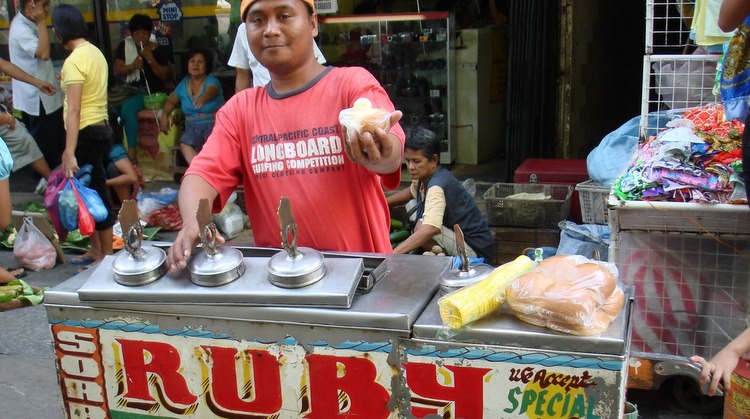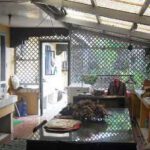
Any foreigner new to the Philippines whether tourist or not will soon hear the terms ‘dirty kitchen’ and ‘dirty ice cream.’
It was during my house hunting that I first heard ‘dirty kitchen.’ I was genuinely puzzled. The words were uttered with pride and an inner satisfaction which added to my puzzlement. How on earth could someone be proud of a ‘dirty kitchen’? It conjured up images of cockroaches and rat infestation in my western head. Thank goodness I could not have been any further wide of the mark.
A ‘dirty kitchen’ is such a great idea. It is practical too. I’m sure its origins lie in the days when all cooking was done on an open fire fueled by wood or maybe coal if available. There was no bottled gas or electric stoves back then.
Many Advantages of a Dirty Kitchen
The first advantage of the outdoor cooking is safety particularly if an open fire is used, as it still is in many areas of the Republic. I have heard it said that it derives its name owing to the fact that dirt or soil was used as the base for the open fire. The other fairly obvious advantages are that it isolates cooking smells and smoke from the inside of the home. Many Filipino dishes are fried in oil in the stove top pan. Fried fish will stink the house out if not cooked outside in the dirty kitchen. A bonus is that the heat generated from the cooking is also kept outside. A factor not to be sniffed at in a tropical climate.
Another way of looking at the dirty kitchen is that it is a bit like an outside BBQ area with the emphasis on practical as opposed to some of the clinically clean BBQs I have seen in the United States. I have seen outside BBQ areas in California that would put a top class restaurant kitchen to shame with the amount of stainless steel used!
You will find the dirty kitchen in both rural and urban areas of the Philippines. The rural version will more than likely be the wood fueled variety with the likes of mango trees, coconut shells and talisay being the mainstay of the fuel. It is said that the wood adds flavor to the cooked meat or fish. That is easy to believe! The urban cousin will invariably be fueled by gas hooked up to a two, three or four burner stove.
Dirty Ice Cream
Like a ‘dirty kitchen’ the term ‘dirty ice cream’ was new to my foreign ears. Once again I was thinking who would want to eat contaminated ice cream? The ‘dirty ice cream’ man or sorbetero can be regularly seen on my sub division as he pedals his bicycle and rings his hand held bell to announce his presence. A more pleasant sound than the monotonous chimes heard coming from the ice cream vans to be found all over the UK. Sorbeteros are also to be seen pushing around their brightly colored carts. Whether cart or a bicycle the ice cream will be kept cold in a metal container using shaved ice and salt to keep the temperature as low and as long as possible. Your serving of the cooling dessert could be in a cup, cone or even in a bread bun.
Traditional Philippine Process
On speaking to the older generation here I discovered the process of making the ‘dirty ice cream’. Or at least how it used to be made. It involved the use of a wooden bucket filled with ice. Inside that bucket was a metal cylinder that contained the liquid ice cream ingredients. The cylinder was connected to a handle which was turned by hand until the mixture reached its desired consistency. The turning would take an hour or so of churning therefore it was common for all the family to lend a hand.
The Philippines is noted for its variety of ice cream flavors and some of them are really traditional – mantecado (Spanish crumble cake) ube queso helado (a kind of iced cheese with the distinctive purple coloring of ube), pinipig (a topping made from rice), nangka (jackfruit) and salted caramel.
The traditional basic ingredients of true ‘dirty ice cream’ are carabao milk and eggs. Coconut milk and cassava flour are commonly used to give it a distinctive flavor. The homemade variety of ice cream is known as ‘dirty’ to differentiate it from the store variety or ‘clean’ ice cream. I enjoy ‘dirty ice cream’ but must admit to some trepidation on my first tasting. I survived and I am sure you will too.
The answer to the question in the title is entirely up to you. I am sure you will enjoy the products of both the ‘dirty kitchen’ and ‘dirty ice cream’ where ever you eat!



I must admit the term dirty kitchen did take awhile to settle into my pshycie.
Although I’ve seen a lot of the ice cream
And the peddle bike I have never heard the term dirty ice cream! Maybe my asawa has been trying to save me from that term! Pretty funny!!
I have heard the ice cream called The 12 Flavors of The Road due to those guys peeing on the side of the road and not washing their hands. I never, ever, eat their ice cream
I must admit that the thought of frying fish in the house is a stinky proposition, and an outside dirty kitchen sounds like a very good idea. I naturally do all of my barbecuing outside and if/when my asawa and I move to the Philippines, we will have a dirty kitchen. As for dirty ice cream, it will take some time to get used to the name. I think everyone in the U.S. has either made or eaten hand-cranked home-made ice cream, so if I think of dirty ice cream that way I could get it down. The flavors in the P.I. sound interesting. But let’s not forget mango-flavored ice cream, or even avocado. The sky is the limit so use your imagination. Bob.
I have now been here a full year. Yeah! But I have yet to hear either “dirty” term; not even my Filipina fiancee knew what the terms meant. So we both learned something new.
The apartments where I live have a small concrete walled area for each ground unit, I think what I have seen noted as service area, for doing laundry by hand. All but mine have slanted awnings made up of panels of corrugated metal, fiberglass, wood, or apparently whatever could be found. Every day I can hear, and smell, cooking being done in the unit to the east. And I mean from inside my unit. When they cook fish, the horrendous smell permeates through the area where the aircon sits. Other days it is a very strong, eye-watering, smell of so much garlic that I think it would make Emeril wince.
As far as the ice cream peddler (pun intended) goes I would cherish hearing some nice chimes. Currently, the one who hits this neighborhood plays music through what seems to be a small bullhorn like speaker that has seen its days. The tinny sounding, warbling “song” is short and plays over and over. The ice cream he sells is typical fare you would find in the US; Popsicles, Fudgesicles, and novelty ice cream.
Thanks for this info. I have wondered about this since visiting Cebu where I will soon move.
thank you for clearing things up for me I was also worried about the term dirty kitchen and as for the ice cream I do no and love it also there are some places that make coconut milkshakes they are heavenly not been able to find any over here in the uk
The term “dirty kitchen” quickly resonated with me because in Singapore it’s called a “wet kitchen” and is usually very much separated, but still inside the home (or apartment) so that the oil spatter and smell are contained in that space. It took me a while to get used to the idea, but now we designed it into our new home and really can’t imagine it any other way!